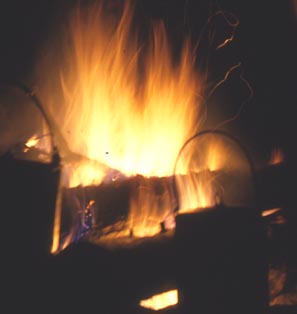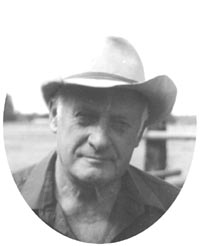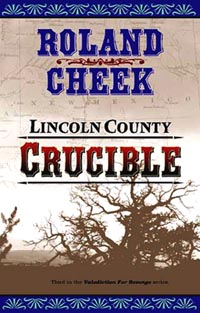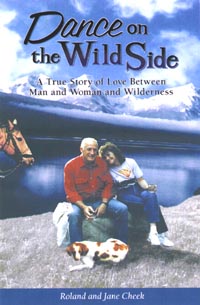a weblog sharing info on outdoor skills and campfire musing by a guy who spends a bunch of time in pursuit of both
CULTURE
WHERE -
TALES ARE TOLD OF
Welcome to Roland Cheek's Weblog
Roland is a gifted writer with a knack for clarifying reality. Looking forward to more of his wisdom
- Carl Hanner e-mail
The last word in ignorance is the man who says of an animal or plant: "What good is it?" If the land mechanism as a whole is good, then every part is good, whether we understand it or not. If the biota, in the course of eons, has built something we like but do not understand, then who but a fool would discard seemingly useless parts? To keep every cog and wheel is the first precaution of intelligent tinkering.
To access Roland's weblog and column archives
Tip o' the Day
One of the better outdoor cooking tips we've learned is to soap the outside of our pans prior to cooking over an open fire. Why? Because the pans will clean up better after you're through cooking, even trimming down the campfire black. Either dish soap or hand soap works fine.
Sometimes Jane prepares a surprise snack that's always a hit with the kids (me, too): She will core an apple and fill it with peanut butter mixed with raisins. Then she'll wrap the snack in foil and hand 'em out to be tucked into saddlebags or daypacks. Then a guy or gal can sneak it out and eat it when there's nobody else around to horn in.
I've heard bee stings and mosquito bites will ease right away if sprinkled with meat tenderizer. I've never tried it myself because our meat is always tender, and old Montana ex-outfitters are too tough to be bothered by mere insects.
To learn more of Roland's & Jane's exciting life as outfitters and guides in the Bob Marshall Wilderness, read Dance On the Wild Side
No, Roland Cheek hasn't been in a gunfight at the O.K. Corral or punched dogies down the streets of Abilene. But he has straddled rawboned ponies over 35 thousand miles of the toughest trails in all the Northern Rockies and spent five decades wandering the wild country throughout the West. Now, after crafting six prior nonfiction books, hundreds of magazine articles, and thousands of newspaper columns and radio scripts about his adventures, the guy has at last turned his talent to Western novels, tales from the heart, dripping with realism, and based in part on a plethora of his own experiences.
* * *
FICKLE FISHING OF MOUNTAIN LAKES
High mountain lakes can be fickle. In more ways than just fishing, too. Ice-out, for one. Weather, wind, rain, snow. You name it and mountain lakes can get it, sometimes coming all on the same day. Like a beautiful woman, they can promise much but leave you devastated, humiliated, unfulfilled. or they can leave you elevated, exalted, and satiated. And there's no way to know beforehand which it'll be.
I've arrived at a high mountain lake where three-pound rainbows splash the water like canister shot from a trench mortar. I'v dropped my pack and fumbled my fishing rod together, then dashed to the shoreline and splashed to my belt buckle to begin flycasting. I've caught and released a scrappy fish or two, grinning all the while like a gang saw in a pine mill . . . then had the fish quit feeding and water turn bartop smooth for the next three days.
More often than not, though, I've clambered to the high cirque where the sapphire lake lay and found the water bartop smooth upon arrival--and stayed that way during my entire visit.
Just getting to high mountain lakes can sometimes be fickle. A grizzly bear once drove me from the trail to Jewel Basin's Birch Lake. And in years gone by, snow plugged a pass or two when I pushed the season.
Once I clambered over nine-foot snowdrifts to find the way to remote Skookum Lake--only to find it covered with three feet of rotting ice and slush. So I clambered back over nine-foot snowdrifts, then mushed my way to a mere dot on the map; a lake I'd never known others to fish. That lake was also frozen, so I chopped a hole in the ice to find the lake's bottom staring back from below six inches of water.
Speaking of Jewel Basin, I've found Clayton Lake still half-covered with ice in late may, and I've slipped and slid down to an ice-covered Black Lake in June. But the one to take the cake was standing on a ridgetop and looking down at a still-frozen Seven Acres Lake one day in early August. Then there was the time Jane and I hiked the Edna Creek trail to the top of the ridge looking down into Tranquil Basin and saw trout dimpling the water like fishing time at the hatchery--and was too tired to clamber our way down.
What's all the attraction to fishing high mountain lakes?
Ask me to show you a picture of the lunkers taken from Clayton. Or the nice mess we caught from Blackfoot Lake after finding Black lake unfishable.
Ice-out can be the hottest fishing of the season . . . or the most miserable time of your life. It all depends on how fickle you find it at that point in time. Rain? Snow? Wind? Cold? Expect it all within minutes of your arrival. I remember Al Reid telling about a sudden thunderstorm that turned to hailstones on his way to Margaret Lake--and how he cowered beneath a rock overhang for over an hour before beating his way back to his car with his tail between his legs.
Need the weather always be balmy and the fishing fantastic for one to enjoy a high lakes adventure? Not at all. Solitude counts for something. So does the chance to polish one's primitive skills.
We didn't fish Seven Acres Lake that hot August day. But we did swim in the frigid waters of Crater Lake, and drip-dried on a rock outcrop while puzzling over--and solving--most of the world problems of that day.
As with a beautiful woman, one must make do with what comes. Disappointment is the norm, I'll warn you. But just once spent in the enchanting embrace of a mountain lake at its best and you'll be hooked for life!
Roland Cheek wrote a syndicated outdoors column (Wild Trails and Tall Tales) for 21 years. The column was carried in 17 daily and weekly newspapers in two states. In addition, he scripted and broadcast a daily radio show (Trails to Outdoor Adventure) that aired on 75 stations from the Atlantic seaboard to the Pacific Ocean. He's also written upwards of 200 magazine articles and 12 fiction and nonfiction books. For more on Roland, visit:
www.rolandcheek.com
Recent Weblogs
Tuesday, June 3, 2008
for more info about these and other Roland Cheek books
There's a bunch of specific info about Roland's books, columns, archives and radio programs. By clicking on the button to the left, one can see Roland's synopsis of each book, read reviews, and even access the first chapter of each of his titles. With Roland's books, there's no reason to buy a "pig in a poke."
for detailed info about each of Roland's books
Read Reviews
Read their first chapters
For interested educators, this weblog is especially applicable for use in history classes, as well as for journalism students.
Roland, of course, visits schools. For more information on his program alternatives, go to:
NEXT WEEK:
THERE'S NO SUCH THING AS FATHER'S DAY
www.campfireculture.com
Award-winning Western writer Richard Wheeler says of Roland's novels:
Like Louis L'Amour, Roland Cheek knows how to start a story at a gallop and hold the reader to the last page. he writes richly and authentically about the Old West, drawing from an encyclopedic knowledge of his subject.
1st in series
2nd in series
3rd in series
4th in series
5th in series
6th in series
The place? Montana's Bob Marshall Wilderness . . . When? Then and now -- and always will be -- the way God made it.
Tales of low chuckles and high adventure spun for pleasure reading around the campfire, before your hearth, or with your morning coffee
Too honest to deny its roots in hunting, but too human to be contained by its limits, The Phantom Ghost of Harriet Lou is a book for those who care about wildlife of all kinds.
source links for additional info
to send this weblog to a friend
to tell Roland what you think of his Campfire Culture weblog
to visit Roland's newspaper columns and weblog archives
- Aldo Leopold












